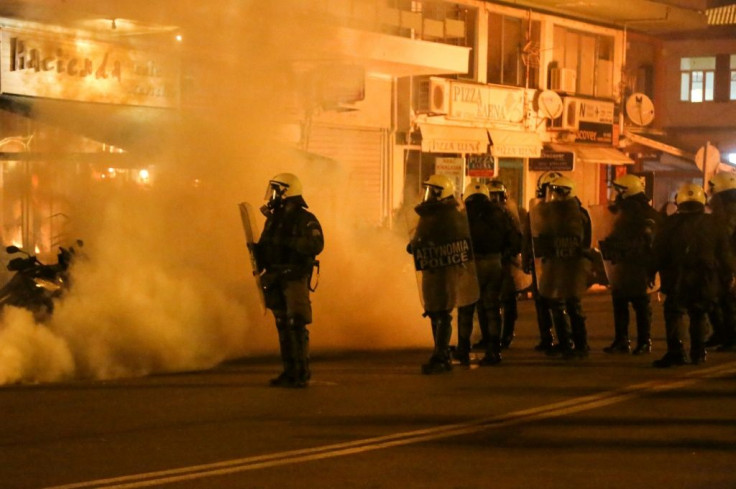Tear Gas On Greek Islands In Face-off Over Migrant Camps

Greek riot police on Tuesday fired tear gas to disperse angry locals on the islands of Lesbos and Chios protesting against the planned construction of controversial new migrant camps.
Residents have long complained that the presence of thousands of asylum-seekers threatens safety and public health and oppose government plans to build new camps for them on the islands.
Tensions came to a head overnight at the harbours of both islands, where hundreds of locals had gathered to prevent the arrival of construction machinery and riot police reinforcements.
As two ferries each carrying around 500 riot police docked at Lesbos and Chios, protesters threw stones and firebombs. The police responded with tear gas to clear the way.
Residents also parked cars and garbage trucks on rural roads leading to the camp sites, which are to house up to 7,000 people each, in an attempt to block construction.
Later in the day protesters threw objects at police in the hills near to the camp sites, local TV footage shows.
"We are the victims of an unprovoked attack in the forest with tear gas and flash bombs," Yiannis Bournous, a Chios lawmaker with the leftist opposition Syriza party, said in a video posted online.
"Hundreds of unarmed locals are fleeing," he said.
A few protesters had to be treated for breathing trouble, an AFP photographer at the scene said.
There are more than 38,000 migrants crowded into camps on the islands of Lesbos, Samos, Chios, Leros and Kos despite an official capacity of just 6,200.
The conservative government which came to power in July has announced that the camps on Lesbos, Samos and Chios will be shut down this year, to be replaced with new, smaller facilities that are to be operational by mid-2020.
The administration of Prime Minister Kyriakos Mitsotakis has tried to alleviate the problem by relocating thousands of migrants to other parts of Greece, but many communities on the mainland have also stonewalled the move.
After weeks of fruitless talks with local authorities, the government has insisted the plan would go ahead despite opposition.
"Work on the closed camps will begin immediately... talks cannot continue indefinitely or be an excuse for inaction," government spokesman Stelios Petsas told reporters Tuesday.
Main opposition leftist party Syriza has accused the government of undemocratic behaviour.
"We will not allow Mr Mitsotakis and his government to turn the islands into a battleground," said Syriza spokesman Alexis Charitsis.
Island officials and residents have told the Greek government that after five years on the frontlines of the European migration crisis, they are no longer prepared to accept thousands of asylum-seekers.
The International Rescue Committee called on the EU to step in to help Greece manage the crisis.
"Greece cannot continue to deal with the situation on its own," said Dimitra Kalogeropoulou, the IRC director in Greece.
"EU member states need to step up in solidarity and share responsibility for protecting people in need," said Dimitra Kalogeropoulou, Greece director of the International Rescue Committee.
The UN's refugee chief on Friday called for urgent action to address the "shocking and shameful" conditions migrants are forced to live in at reception centres on the Greek islands.
Swift measures were needed to reduce overcrowding and improve living conditions on the islands prioritising water, sanitation and healthcare, UN's High Commissioner for Refugees (UNHCR) Filippo Grandi said.
© Copyright AFP {{Year}}. All rights reserved.





















